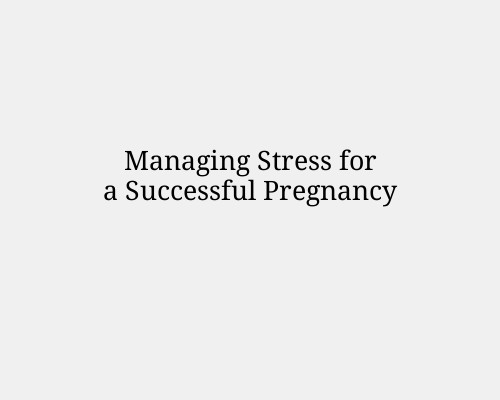
Pregnancy is a transformative period in a woman’s life, but it can also bring about significant stress. Managing stress effectively is crucial for both the mother's well-being and the baby’s development. Chronic stress during pregnancy has been linked to complications such as preterm birth, low birth weight, and developmental issues in the child. Therefore, expectant mothers should adopt strategies to reduce stress and create a calm and supportive environment.
Understanding Pregnancy-Related Stress
Stress during pregnancy can stem from various sources, including physical discomfort, hormonal changes, financial concerns, relationship dynamics, and work responsibilities. While mild stress is a normal part of life, excessive or chronic stress can trigger the release of cortisol, a hormone that, in high levels, can negatively impact foetal development.
Effective Stress Management Strategies
Prioritizing Self-Care
Self-care is essential during pregnancy. Taking time for relaxation and activities that bring joy can help reduce stress levels. Engaging in hobbies, reading, or listening to calming music can be beneficial.
Practicing Mindfulness and Meditation
Mindfulness and meditation techniques help expectant mothers stay present and calm. Deep breathing exercises, progressive muscle relaxation, and guided imagery can effectively reduce anxiety and promote relaxation.
Maintaining a Healthy Diet
A well-balanced diet supports both physical and mental health. Nutrient-dense foods such as fruits, vegetables, lean proteins, and whole grains help stabilize mood and energy levels. Avoiding excessive caffeine and processed foods can further prevent stress spikes.
Engaging in Gentle Exercise
Physical activity releases endorphins, which act as natural stress relievers. Low-impact exercises like prenatal yoga, swimming, and walking can help maintain physical health while reducing stress levels.
Ensuring Adequate Rest and Sleep
Pregnant women often experience sleep disturbances due to hormonal changes and discomfort. Creating a bedtime routine, using pregnancy pillows, and avoiding screens before bed can improve sleep quality and reduce stress.
Seeking Emotional Support
Building a strong support system is crucial. Talking to a partner, family members, or friends about concerns can provide emotional relief. Joining prenatal support groups or seeking therapy can also be helpful for managing anxiety and fears related to pregnancy and childbirth.
Managing Work and Financial Stress
If work-related stress is overwhelming, setting realistic expectations and discussing accommodations with an employer can help. Planning finances in advance and seeking advice from financial experts can alleviate monetary concerns and create a sense of security.
Limiting Exposure to Negative Information
While staying informed is essential, excessive consumption of negative news or distressing birth stories can heighten anxiety. Focusing on positive birth experiences and reliable medical advice can create a more optimistic mindset.
Practicing Positive Affirmations
Daily affirmations can reinforce confidence and positivity. Repeating statements like "My body is capable and strong" or "I am preparing for a healthy pregnancy and birth" can shift focus from fear to empowerment.
Seeking Professional Help When Needed
If stress becomes overwhelming, seeking professional guidance from a therapist, counsellor, or doctor is essential. Mental health support during pregnancy can improve overall well-being and contribute to a successful pregnancy.
Conclusion
Managing stress during pregnancy is essential for both maternal and foetal health. By incorporating mindfulness, proper nutrition, physical activity, and emotional support into daily life, expectant mothers can navigate pregnancy with a sense of calm and confidence. Taking proactive steps to reduce stress not only benefits the mother but also fosters a positive and healthy start for the baby.